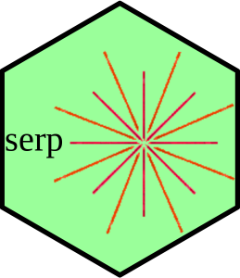Smooth Effects on Response Penalty for CLM.
serp 
Overview
The serp R package fits cumulative link models (CLMs) with the smooth-effect-on-response penalty (SERP). The cumulative model developed by McCullagh (1980) is probably the most frequently used ordinal model in empirical studies. However, the stochastic ordering property of the general form of the model poses a very serious challenge in most empirical applications of the model. For instance, unstable likelihoods with ill-conditioned parameter space are frequently encountered during the iterative process. serp implements a unique regularization method for CLMs that provides the means of smoothing the adjacent categories in the model. At extreme shrinkage, SERP causes all subject-specific effects associated with each variable in the model to shrink towards unique global effects. Fitting is done using a modified Newton’s method. Several standard model performance and descriptive methods are also available. See Ugba, 2021, Ugba et al., 2021 and Tutz and Gertheiss, 2016 for further details on the implemented penalty.
Example
Consider the cumulative logit model of the wine dataset, where the rating of wine bitterness is predicted with the two treatment factors, temperature and contact.
## The unpenalized non-proportional odds model returns unbounded estimates, hence,
## not fully identifiable.
f1 <- serp(rating ~ temp + contact, slope = "unparallel",
reverse = TRUE, link = "logit", data = wine)
coef(f1)
## The penalized non-proportional odds model with a user-supplied lambda gives
## a fully identified model having bounded estimates. A suitable tuning criterion
## could as well be used to select lambda (e.g., aic or cv)
f2 <- serp(rating ~ temp + contact, slope = "penalize",
link = "logit", reverse = TRUE, tuneMethod = "user",
lambda = 1e1 ,data = wine)
coef(f2)
## A penalized partial proportional odds model with one variable set to
## global effect is also possible.
f3 <- serp(rating ~ temp + contact, slope = "penalize",
reverse = TRUE, link = "logit", tuneMethod = "user",
lambda = 2e1, globalEff = ~ temp, data = wine)
coef(f3)
## The unpenalized proportional odds model with constrained estimates.
## Under estreme shrinkage, estimates in f2 equal those in this model.
f4 <- serp(rating ~ temp + contact, slope = "parallel",
reverse = FALSE, link = "logit", data = wine)
summary(f4)
Installation and Use
Before installing serp, it is encouraged to have a recent version of R installed. The released version of serp can be installed from CRAN with:
install.packages("serp")
or the development version from GitHub with:
if (!require("devtools")) install.packages("devtools")
devtools::install_github("ejikeugba/serp")
Load serp into R environment with:
library(serp)
Community Guidelines
Pull requests are welcomed! Please submit your contributions to serp through the list of Pull Requests, following the contributing guidelines. To report issues and/or seek support, please file a new ticket in the issue tracker, and expect a feedback ASAP!
Code of Conduct
Please note that serp is released with a Contributor Code of Conduct. By contributing to this project, you agree to abide by its terms.
References
McCullagh, P. (1980). Regression Models for Ordinal Data. Journal of the Royal Statistical Society. Series B (Methodological), 42, 109-142. https://doi.org/10.1111/j.2517-6161.1980.tb01109.x
Randall, J (1989). The analysis of sensory data by generalized linear model. Biometrical Journal, 31, 781–793. https://doi.org/10.1002/bimj.4710310703
Tutz, G. and Gertheiss, J. (2016). Regularized Regression for Categorical Data (With Discussion and Rejoinder). Statistical Modelling, 16, 161-260. https://doi.org/10.1177/1471082X16642560
Ugba, E. R., Mörlein, D. and Gertheiss, J. (2021). Smoothing in Ordinal Regression: An Application to Sensory Data. Stats, 4, 616–633. https://doi.org/10.3390/stats4030037
Ugba, E. R. (2021). serp: An R package for smoothing in ordinal regression Journal of Open Source Software, 6(66), 3705. https://doi.org/10.21105/joss.03705
